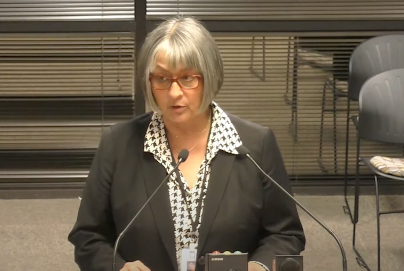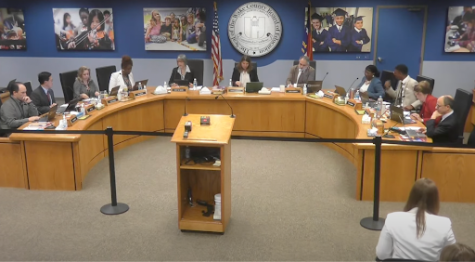WCPSS: Outgoing Superintendent Cathy Moore outlines budget priorities
The Wake County School Board’s April 11 meeting included a budget proposal which addressed specific priority areas.

Wake County Superintendent Catty Moore delivers her annual budget proposal for the 2023-2024 school year in her final year of service, as she plans to retire on July 1, 2023.
April 14, 2023
The 2023-2024 Wake County Public School System’s proposed budget focuses on four priority areas, established as part of a multi-year plan beginning several years ago in the 2019-2020 school year. The Wake County School Board assembled on April 11, in order to discuss Wake County Superintendent Catty Moore’s budget proposal for the 2023-2024 school year.
Based on data within the proposal, the total operating budget is $2.1 billion, serving 10,000 staff and 159,000 students across 197 schools.
Federal sources of funding, including pandemic relief, account for 12% of the total budget. The proposed budget intends to allocate $32 million of the allotment from federal pandemic relief and funding to permanent sources. The shift is planned to continue over the following two years. Roughly 54% of the budget proposal comes from North Carolina’s public school fund, and an additional 34% comes from local sources, with a majority coming from the county appropriation.
Employee compensation, instructional support technicians, behavioral health supports and maintenance and operations formula alignment are among the priority areas of the school board. The budget also accommodates a 9% increase in annual spending per student, possibly indicating efforts to raise North Carolina student spending, which ranked 45 out of 51 states (including District of Columbia) in a 2022 Education Data Initiative report.
The proposals would require a $55.8 million, or 9%, increase to the 2023-2024 school year budget. Catty Moore attributed the need for funding to the “bold and ambitious” goals for the board’s upcoming 2023-2028 Strategic Plan and priority areas investments.
The employee compensation priority area addresses the longstanding issue of teacher vacancies and high turnover rates, one of the board’s primary concerns. In February, a State Board of Education meeting released a report that revealed a 58.4% increase in teaching vacancies in the fall of 2023.
During the public comments session of the meeting, numerous attendees expressed their concern about the understaffing crisis, including transportation department safety assistant Bridget Bridges.
“We go into some of the most dangerous communities to pick up our children, deliver them to school and back home. Yet with all these obstacles, we do our job successfully with pride and compassion,” said Bridges. “Now we’re asking for compassion to be given to us.”
Bridges was one of several speakers from the North Carolina Association of Educators public school union, requesting a salary increase to $20 per hour and improved working conditions.
State and local expenditures–96% and 68%, respectively–are proposed to be spent on raising salaries for non-certified staff, including bus drivers, lunchroom employees and custodial staff.
The board began raising wages for employees paid from non-certified pay scales in increments during the 2019-2020 school year. The budget proposes to raise salaries for said staff to a minimum of $17 per hour in 2023-2024.
The Instructional Support Technicians priority area increases spending on technological devices, which included an additional 135,000 laptops and 6,000 iPads during the pandemic. In future years, the board expects to spend an additional $22 million to $25 million on laptops and iPads for classrooms. The costs come in tandem with recent legislation that would require high school students in the state to take a computer science course in order to graduate, pushing to boost digital literacy among graduating students.

In light of a recent CDC report warning of a looming mental health crisis among youth, the board seeks to support school psychologists and social workers in order to meet students’ social and emotional needs through the Behavioral Health Supports priority area. The increase is part of another multi-year plan to expand behavioral health support and would spend $37.8 million through the 2026-2027 school year.
The report details a backlog in building maintenance repairs, including heating and cooling systems in facilities. The proposed budget brings Maintenance and Operations a step closer to changing to the industry standard, phasing out the outdated budget and using $7.8 million of project funds to adjust to the industry standard in the next five years.
The school board is expected to hold a final public discussion on May 2 before sending the budget to Wake County Commissioners for revisions. If the budget is not approved by June 30, the school board will use their interim budget at the beginning of next school year.










































































